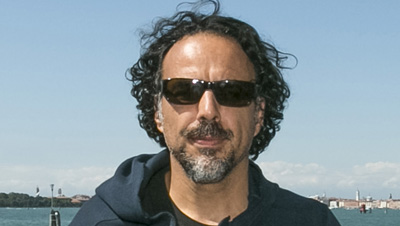
- Golden Globe Awards
ALEJANDRO GONZALEZ IÑARRITU (Birdman)
When Alejandro González Iñarritu was 17, he decided to go see the world. Having just been kicked out of high school due to poor grades, Iñarritu followed the steps of so many of his generation (and many other adventurers before them): he signed up for a job as a merchant seaman.During the next two years the future director would cross the ocean several times to ports of call in Europe, Asia and Africa. It was a period of discovery and self-exploration that, he says, shaped his personality and worldview. Today many of the places he visited as a young sailor show up in his movies, and the themes of connection and disconnection over distance, culture and language are constant in his work.Before taking to sea, Iñarritu led an uncomplicated life in his hometown, Mexico City, in a solid working class family. His father, a former wealthy banker, had suffered major business losses and declared bankruptcy when Iñarritu was five years old. He was, however, a less than stellar student, a crisis that came to a head when he was finally expelled, in 1980.Back in Mexico in 1984, Iñarritu enrolled in the Iberoamaricana University to study communications, and, soon found a job as a disc jockey at WFM, Mexico’s top radio station. Iñarritu embraced the job with gusto – to this day he credits the experience (and the music) as essential to his work as a filmmaker. In four years he became the station’s musical director and, in quick succession, extremely bored with the job, which he quit to launch a new career in advertising.The short narrative bursts of TV commercials at first fascinated Iñarritu and excited his imagination. He trained his eye writing and directing TV ads, and soon began hungering for more. Meeting author Guillermo Arriaga pushed his hunger into action. Iñarritu and Arriaga began collaborating on what, at first, was supposed to be a collection of 11 short films about the contrasts and contradictions of life in Mexico City.The process quickly evolved, integrating the 11 snapshots into a singular but multi-layered narrative that would eventually become Iñarritu’s first feature film, Amores Perros: a tangle of lives brought together by a car crash on the streets of Mexico City. Nominated for a Golden Globe and an Academy Award, winner of the AFI Festival and the Critics Week at Cannes, Amores Perros established Iñarritu as a filmmaker of international caliber. It also single-handedly launched the international career of its star, Gael Garcia Bernal.Iñarritu’s collaboration with Arriaga continued in the director’s next two films, which marked his entry into English-language filmmaking: in 2003, 21 Grams, starring Sean Penn, Benicio del Toro and Naomi Watts; and, in 2006, Babel, with Brad Pitt, Cate Blanchett and Gael Garcia Bernal. Both films continue Amores Perros’ multiple-but-interconnected narratives, and expand on its the themes of grace and redemption through the crucible of pain and loss. 21 Grams earned Academy Awards and BAFTA nominations for Naomi Watts and Benicio del Toro, and Babel won the Golden Globe for best picture- drama, and an Academy Award for Gustavo Santaolalla’s original score, on top of a flurry of nominations.His next project, Biutiful, signaled a departure: a co-production with Spain and shot in several locations around the country, Biutiful is Iñarritu’s first film without Arriaga, his return to Spanish-language stories and the end of the multi-narrative phase: the plot follows the last days of a man (Javier Bardem) in the poor outskirts of Barcelona, seeking to make amends (and sense) of his life. Bardem was nominated for the Best Actor Academy Award, and the film was nominated for best foreign language picture both at the Golden Globes and Academy Awards.For this year’s Birdman, the day-in-the-life of Riggan (Michael Keaton), a struggling, once-famous actor-turned- aspiring Broadway star that has already rocked the Venice Film Festival, Iñarritu moved in a different direction: inward. “I personally recognize myself in Riggan by my creative process”, he says. “It has always been tortuous for me. Because I’m very perfectionist. That voice inside of me is always telling me how bad or how stupid or how mediocre I am and it could have been better, it should have been better.”Ana Maria Bahiana

